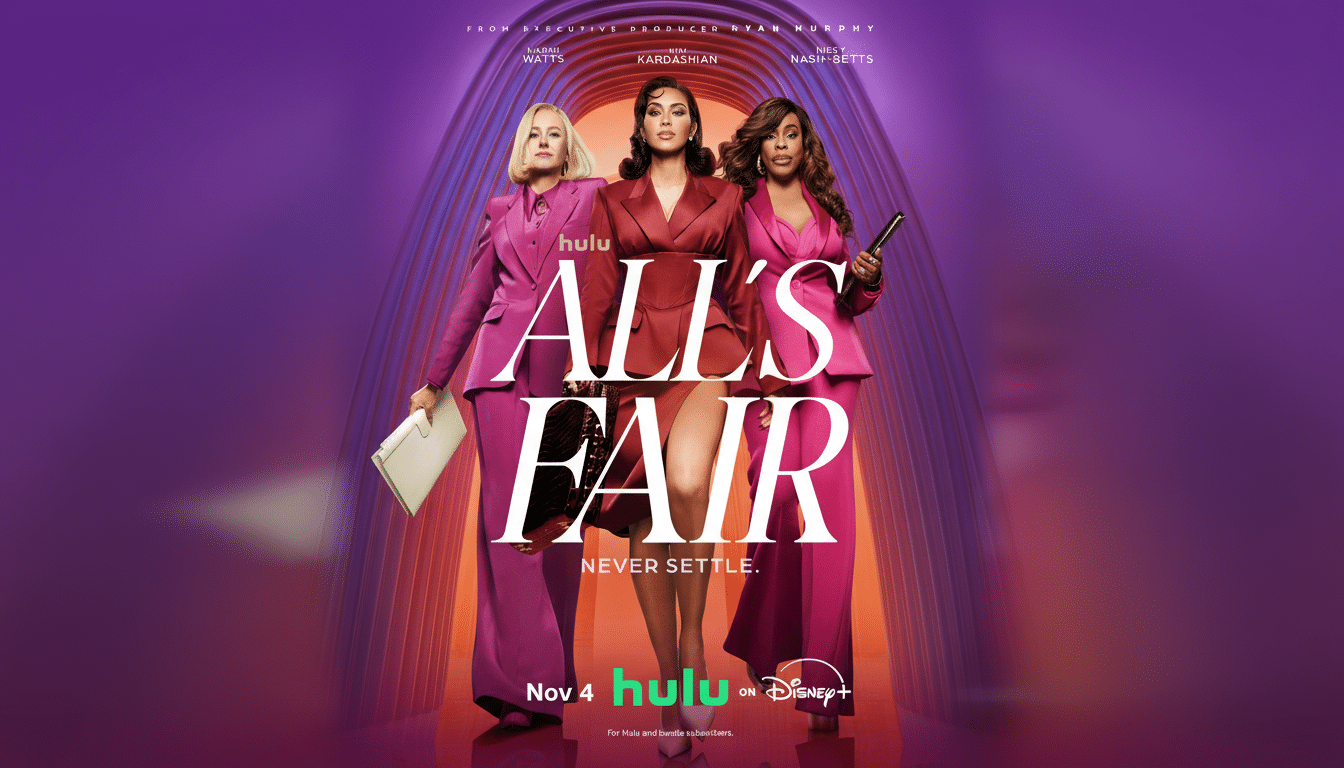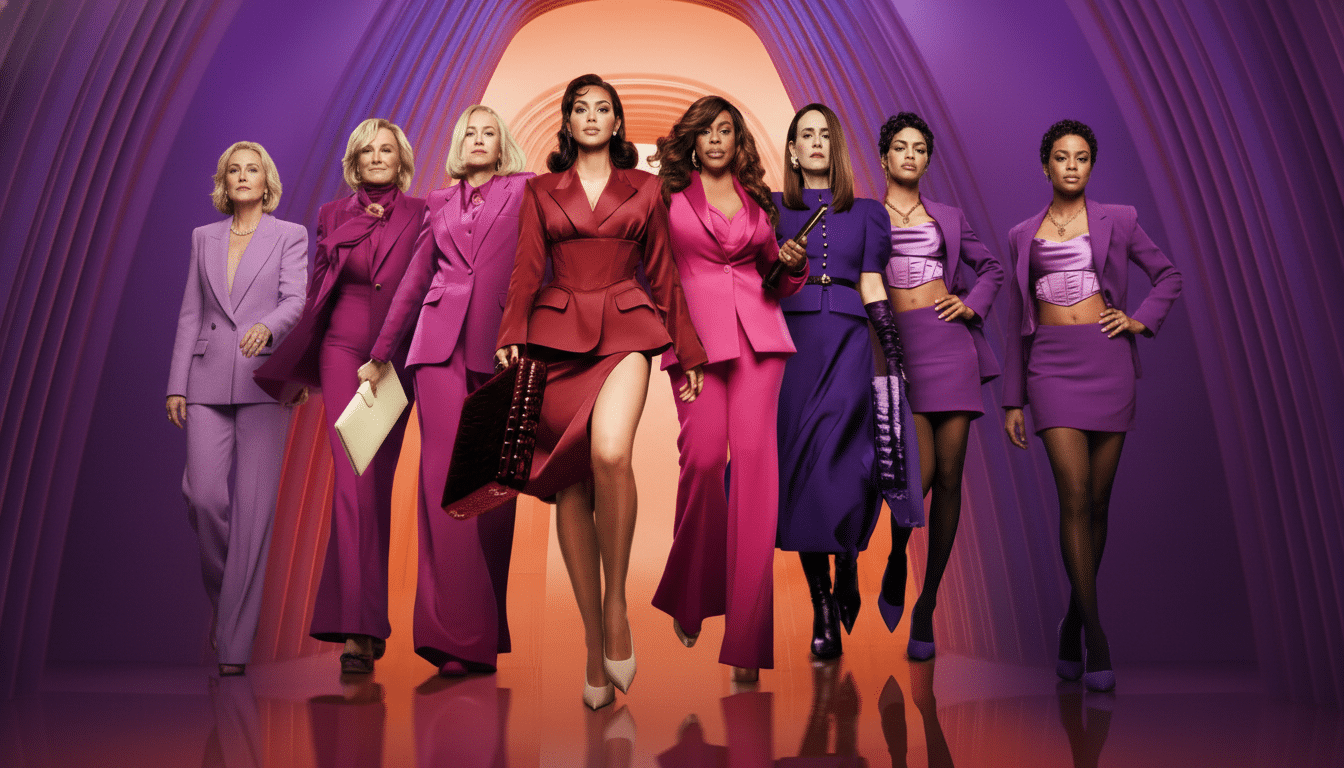Ryan Murphy’s soapy new legal drama All’s Fair has released its first episodes on Hulu, and the web is zeroed in on one thing more than any other: that bold, did-they-just-say-that dialogue. The series is built for high-gloss camp, scattering WTF one-liners like the food at a three-star buffet across boardrooms, courtrooms and couture-filled corridors, calling on everyone from Kim Kardashian, Naomi Watts and Niecy Nash to Sarah Paulson and Glenn Close to hold — wedge or strappy?
Critical reaction is sharply divided — trade reviews, from major outlets, have described the show as uneven — but audiences are snipping scenes and passing them through social feeds at warp speed. It’s the rare scenario in which the script’s flash, not the case law, is what’s leading.

The One-Liners Everyone’s Talking About in All’s Fair
Emerald Greene’s bedside manner is a show of its own. In an early client consult, she delivers a pep talk as if saber-cutting the top off of champagne — sparkly and dangerous and impossibly confident. The tone of the encouragement falls somewhere between life-coach mantra and cross-examination burn, that kind of tonal whiplash that converts a simple reassuring sentiment into a meme incubator.
Then there’s Carrington Lane, Sarah Paulson’s supremely aggrieved gun-law star, who takes exclusion from the women-only firm as her own personal coup d’état. Her baroque outrage is served with the precision of a cease-and-desist letter, spiking metaphors sharp enough to need their own trigger warnings.
Underused libertarian Ronson, limpidly played by Naomi Watts, even gets her own briefing scenes that pirouette from case law to arias of messaging in a single breath. It’s exposition as luxury brand copy: smooth, hyperreal and just this side of plausible.
A running bit about a fruit basket for the firm’s anniversary blossoms into a masterclass in weaponized civility. The gift is ostensibly sweet; the note that comes with it, salt. It’s your classic TV-camp alchemy — turning niceties into narrative napalm.
Kim Kardashian’s Allura Grant is in maximum power mode when the series allows her to mix boardroom strategy with influencer cadence. Her submission to a legal briefing, articulated like a perfectly rehearsed brand pitch, is so self-aware that it folds back in on itself right around to effective.
Nash’s Emerald has a truth-telling monologue that careens from empathy to brutality with nary a tap of the brakes. It’s the sort of address that makes you want to cheer and cringe, an equal measure of “wow, I really needed to hear all of that” and “did she just say that out loud?”
Negotiation is not a neutral verb in Carrington’s hands. A courthouse exchange late in the season reads like a duel fought with velvet gloves; every polite sentence sheaths its stiletto. The sensory, lyrical horror of it all is most triumphant in Paulson’s interpretation, where terror and threat become melodic.
Watts also receives a romantic advisory aside that feels like legal poetry — half sonnet, half statute. It is gloriously, hilariously stupid, in the best possible sense: a reminder that the writers of this show understand that camp has to be serious to function.
Support in this world is not mushy. Emerald’s “I’ve got you” moment arrives at the end of a beat, and what she says next lands like a verbal uppercut that would have an elected official stuttering in disbelief. Tonal flex is part of the fun here: comfort and confrontation, in the same breath.
Allura’s “get real” moment scrapes through the lacquer to bare steel. Kardashian moves from breezy assurance to raw ambition, and the line — a confession cloaked as strategy — lands with more heft than we expect.

A job rejection from Carrington shows up gift-wrapped in good manners and on a scorched-earth lining. It’s a treatise of saying no with your war declaration, and it belongs in the villainy hall of fame.
And outside the courthouse, a nemesis face-off hits a straight soap-operatic note.
Titles are tossed out like royal boasts; threats are worded as etiquette lessons or the grumblings of the self-righteous; and you can almost hear editors on TikTok at work throwing captions up on T-shirts.
Oh, and it must be said: The failed seduction of Glenn Close’s Dina Standish is deliriously purple. It’s a heady blend of flattery, power and theatricality that has the audacity to dare you not to hit replay.
Why These WTF Lines Work for This Legal Drama
All’s Fair plugs into a long tradition of glossy, quotable TV — Dynasty’s boardroom broadsides, Scandal’s sermon-like monologues — where language was not just elevated but embalmed in amber. Some of Murphy’s biggest hits thrive on that friction between real stakes and campy delivery, and this show turns the dial without tearing it off.
Performance is what makes the cringe, what turns it into canon. When Watts buttons a sentence into a rapier or Paulson smiles her way through an implied threat, the line gains physics. Kardashian, for her part, performs for the camera with a slyness that turns corporate ruthlessness into pop performance art.
The Viral Feedback Loop Driving the Show’s Buzz
Short, high-impact lines are catnip to the algorithm. Nielsen’s streaming insights and social studies from companies like eMarketer have frequently noted that discovery of new shows is increasingly funneled through short-form clips and reaction videos, all of which All’s Fair cooks up in audio form tailor-made for subtitled edits. Parrot Analytics has also singled out camp-forward dramas for over-indexing on early demand, like when quotable moments get anyone who watched to say, “oh wow, that is quote-worthy,” and they hear about it immediately.
That loop counts: shareable dialogue can lift a polarizing series by making distinct scenes into cultural products. The lines probably never win over the skeptical audience member who tunes in cringing at how they sound, but in hearing them within a context — that’s where an esoteric tone becomes part of the public conversation.
What That Means for the Future of Legal Drama
Legal shows work when they find the right mix of procedure and personality. All’s Fair tilts the balance in favor of personality and relegates the law to chorus. Whether that gamble pays off will come down to what the writing bakes in under that shiny exterior of character stakes, but as launch strategies go, those WTF one-liners are doing some eye-catching calisthenics.
Whether you love it or hate it, the most quotable lines are the show’s calling card at the moment. If your feeds are not already stuffed with clips, you know why: These characters do not speak so much as wield sentences.

